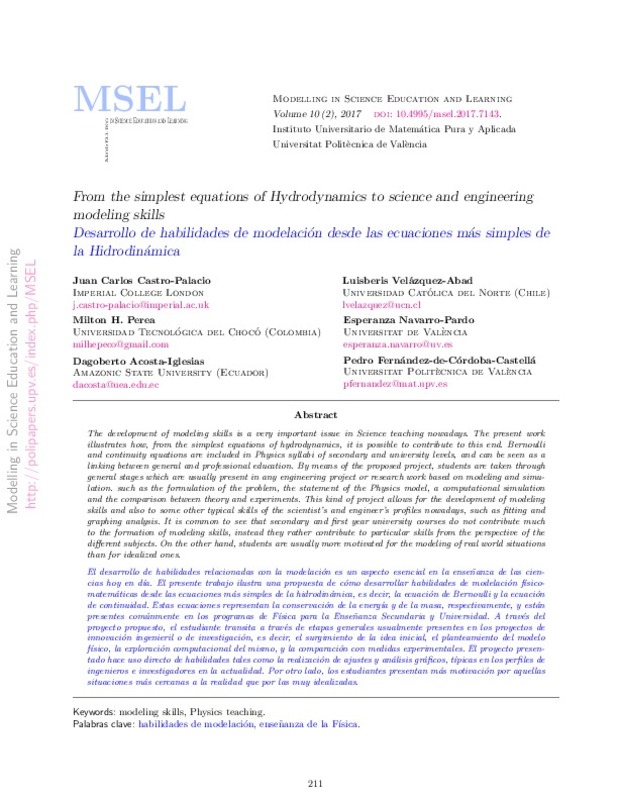JavaScript is disabled for your browser. Some features of this site may not work without it.
Buscar en RiuNet
Listar
Mi cuenta
Estadísticas
Ayuda RiuNet
Admin. UPV
Desarrollo de habilidades de modelación desde las ecuaciones más simples de la Hidrodinámica
Mostrar el registro completo del ítem
Castro-Palacio, JC.; Velázquez-Abad, L.; Perea, MH.; Navarro-Pardo, E.; Acosta-Iglesias, D.; Fernández-De-Córdoba-Castellá, P. (2017). Desarrollo de habilidades de modelación desde las ecuaciones más simples de la Hidrodinámica. Modelling in Science Education and Learning. 10(2):211-222. https://doi.org/10.4995/msel.2017.7143
Por favor, use este identificador para citar o enlazar este ítem: http://hdl.handle.net/10251/90071
Ficheros en el ítem
Metadatos del ítem
| Título: | Desarrollo de habilidades de modelación desde las ecuaciones más simples de la Hidrodinámica | |
| Otro titulo: |
|
|
| Autor: | Castro-Palacio, Juan Carlos Velázquez-Abad, Luisberis Perea, Milton H. Navarro-Pardo, Esperanza Acosta-Iglesias, Dagoberto Fernández-de-Córdoba-Castellá, Pedro | |
| Fecha difusión: |
|
|
| Resumen: |
[EN] The development of modeling skills is a very important issue in Science teaching nowadays. The present workillustrates how, from the simplest equations of hydrodynamics, it is possible to ...[+]
[ES] El desarrollo de habilidades relacionadas con la modelación es un aspecto esencial en la enseñanza de las ciencias hoy en día. El presente trabajo ilustra una propuesta de cómo desarrollar habilidades de modelación ...[+]
|
|
| Palabras clave: |
|
|
| Derechos de uso: | Reconocimiento - No comercial (by-nc) | |
| Fuente: |
|
|
| DOI: |
|
|
| Editorial: |
|
|
| Versión del editor: | https://doi.org/10.4995/msel.2017.7143 | |
| Agradecimientos: |
|
|
| Tipo: |
|








